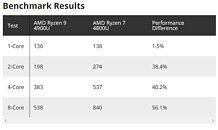Tuesday, April 7th 2020

AMD Readying New Ryzen 9 "Renoir-U" Flagship to Beat Core i7-10710U
When it launched late March, the AMD Ryzen 9 4900H held the distinction of being the fastest notebook processor, the very first time AMD held the distinction, but only for a brief period before Intel launched its Core i9-10980HK to take back the performance lead. Over in the 15 W category, AMD's Ryzen 7 4800U is holding the fort on two fronts - against the "Comet Lake-U" and the "Ice Lake-U." According to reports, AMD wants to take another swing at this category with a new flagship Ryzen 9 series part.
Called the Ryzen 9 4900U, and unearthed from the User Benchmark database by TUM_APISAK, the new SKU is designed to compete with the Core i7-10710U and Core i7-1065G7, in the 15 W category. Lenovo had a notebook featuring this part listed earlier this year. It is configured with an 8-core/16-thread CPU clocked at 1.80 GHz nominal, with up to 4.30 GHz boost, which may seem like a minor speed bump, until you compare its User Benchmark scores with those of the 4800U. Apparently, the 4900U has some boost algorithm secret sauce that makes it a double-digit percentage faster than the 4800U in multi-threaded tests (possibly better spread of boost clocks across multiple cores). The iGPU appears unchanged, with 8 "Vega" compute units (512 stream processors), and up to 1750 MHz engine clocks.
Sources:
TUM_APISAK (Twitter), Tom's Hardware
Called the Ryzen 9 4900U, and unearthed from the User Benchmark database by TUM_APISAK, the new SKU is designed to compete with the Core i7-10710U and Core i7-1065G7, in the 15 W category. Lenovo had a notebook featuring this part listed earlier this year. It is configured with an 8-core/16-thread CPU clocked at 1.80 GHz nominal, with up to 4.30 GHz boost, which may seem like a minor speed bump, until you compare its User Benchmark scores with those of the 4800U. Apparently, the 4900U has some boost algorithm secret sauce that makes it a double-digit percentage faster than the 4800U in multi-threaded tests (possibly better spread of boost clocks across multiple cores). The iGPU appears unchanged, with 8 "Vega" compute units (512 stream processors), and up to 1750 MHz engine clocks.


20 Comments on AMD Readying New Ryzen 9 "Renoir-U" Flagship to Beat Core i7-10710U
:oops:
=> Apparently, the 4900U has some boost algorithm secret sauce that makes it a double-digit percentage faster than the 4800U in multi-threaded tests (possibly better spread of boost clocks across multiple cores).
FX-9800P
72 pts 1-core
124 pts 2-core
210 pts 4-core
214 pts 8-core
214 pts 64-core
Must be really fast if it is lower pts is better.
R9-4900u vs R7-4800u
136 vs 138 // 1-core
198 vs 274 // 2-core
383 vs 537 // 4-core
538 vs 840 // 8-core
I'm just happy AMD has an answer for this race to the base clock bottom that Intel is on. 'Oh, how cute, you managed to change your Skylake clocks' 'Hold my beer'
If they keep this up, they will solidify the idea with people that clockspeed is not everything, and on TOP of that, that AMD Is faster at lower clocks, even much lower turbo's... and Intel can't even hold its 'high' clocks proper. Its a paradigm shift, one that ONLY plays into Intel's 10nm offering with much lower clocked parts across the board... but... there they're stuck at 4c8t :)
*munches popcorn*
what tests did you do, or read, or seen, where it shows that the 10980hk is better than 4900H?
based on what are you saying this? your opinion cause intel goes to 5.3 (for a second, for sure)?
i search the net and couldn't find any laptop reviewed that uses the 10980hk versus the 4900H
Here's the direct comparison between 4900U vs 4800U.
The scores clearly show 4800U being much faster than 4900U because it looks like 4900U is locked to a lower clock (2.35 GHz average clocks).
4900U is much slower here, probably because it locked to a lower TDP or has a very low all-core boost (for this run), in this AMD development platform - AMD Ted3-RN.
LE: I'm not saying your average 4900U will be slower than you average 4800U. I'm saying that TPU's editors have no idea how to read Userbenchmark's scores, even though Tom's editor clearly stated that 4800U is faster and 4900U probably is an engineering sample.
LE2:Please stop making names up. It's Ryzen 4000 U-series.
LE: 4800U is ranked 6th, while 4900U is 80th.
LE2: Both CPUs have the same amount of cores.
LE3: I clearly wasn't saying 4900U will be slower that 4800U, but in this case (AMD development laptop - AMD Ted3-RN) it's clearly locked to a lower TDP or some other thing that limits the all-core boost speed.
Explain to me why would anyone release a higher end SKU which performs worse under any kind of load.
AMD Ryzen 7 4800U (Marketing Sample) => Base clock 1.8 GHz, turbo 3.65 GHz (avg)
AMD Ryzen 9 4900U => Base clock 1.8 GHz, turbo 2.35 GHz (avg)
One sample is operating at a lower sustained TDP(4900U) while the other sample is running at a higher sustained TDP(4800U).
The U-series has a wide range;
zhuanlan.zhihu.com/p/124967122
Comparing a production class HP probook w/ Ryzen 7 4800U to an engineering device(Ted3-RN) w/ Ryzen 9 4900U also isn't going to be one to one. Which is why the better device wins with Ryzen 7 4800U getting higher thus better scores.